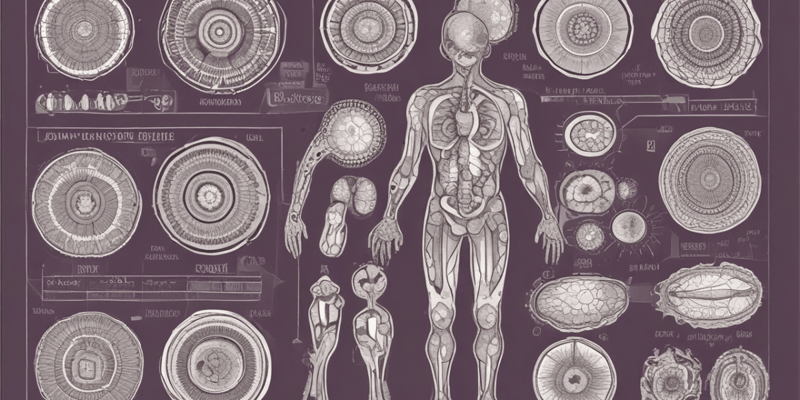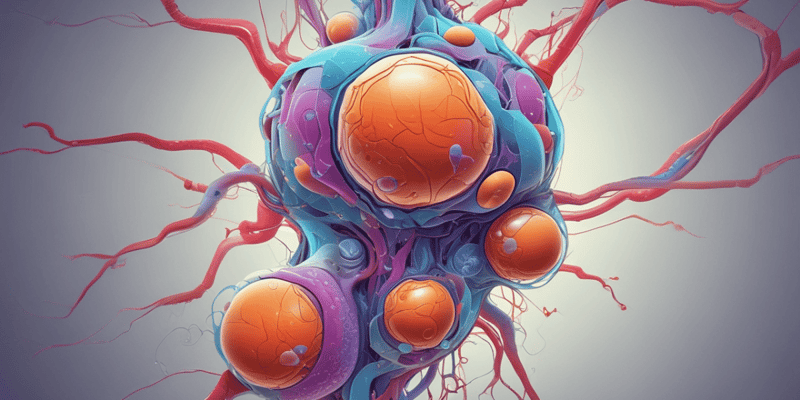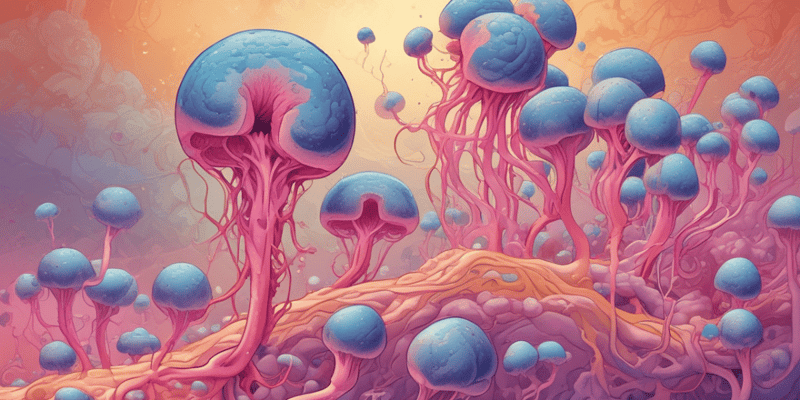Questions and Answers
What is the role of the skeletal system in the human body?
Provides shape, support, protection, helps in movement, and stores essential minerals like calcium and phosphorus.
How are cells organized in the human body?
Cells are organized into various types like neurons, muscle cells, and red blood cells, each performing specific functions.
What is the main function of the digestive system?
To break down food into nutrients and water for absorption by the body.
How do organ systems work together in the human body?
Signup and view all the answers
What are the building blocks of all living organisms?
Signup and view all the answers
What is the function of the respiratory system?
Signup and view all the answers
How does the immune system protect the body?
Signup and view all the answers
Explain the role of the endocrine system in maintaining homeostasis.
Signup and view all the answers
How does the nervous system transmit signals throughout the body?
Signup and view all the answers
What is the main function of the urinary system?
Signup and view all the answers
How is the 'No Search' feature of Microsoft Bing Chat revolutionizing AI assistance?
Signup and view all the answers
What makes the human body a marvel of engineering?
Signup and view all the answers
Define the term 'Organs' and provide examples.
Signup and view all the answers
What role do Cells play in the human body?
Signup and view all the answers
Explain the significance of Tissues in the body and provide examples.
Signup and view all the answers
What are the main focus areas of the discipline of biochemistry?
Signup and view all the answers
Describe the functions of the circulatory system in the human body.
Signup and view all the answers
Explain the role of the endocrine system in regulating essential functions in the human body.
Signup and view all the answers
How does Bing Chat's 'No Search' feature change the way users access information?
Signup and view all the answers
Discuss the significance of physiological processes in maintaining health and wellness.
Signup and view all the answers
Study Notes
Discovering the Wonders of the Human Body
From our tiniest cells to the complex systems that keep us alive, the human body is a marvel of biology and engineering. In this exploration of the human anatomy and its inner workings, we'll dive into cells, the skeletal system, and the interconnected organ systems that make us who we are.
Human Cells
At the center of life itself are cells, the building blocks of all living organisms. Our bodies are composed of trillions of cells, each performing specific functions. These cells are organized into various types like neurons, muscle cells, and red blood cells, each with unique characteristics that enable us to think, move, and sustain life.
Anatomy and the Skeletal System
The skeletal system, composed of bones and cartilage, provides shape, support, and protection for our bodies. We walk, run, and maintain our posture thanks to the intricate system of bones, joints, and muscles. The skeletal system also functions as a mineral reservoir, storing essential minerals like calcium and phosphorus.
Organ Systems
The human body is organized into 11 major organ systems, each with specialized functions that work together to keep us alive and healthy.
- The digestive system breaks down food into nutrients and water, which are absorbed by the body.
- The circulatory system transports nutrients, oxygen, and waste through the body.
- The respiratory system takes in oxygen and releases carbon dioxide through the process of breathing.
- The nervous system processes information and transmits signals throughout the body.
- The endocrine system regulates hormone production and release, maintaining homeostasis.
- The lymphatic system forms part of the immune response, producing lymphocytes and filtering waste.
- The urinary system filters waste from the blood and maintains the body's electrolyte balance.
- The reproductive system generates new life and facilitates sexual reproduction.
- The immune system protects the body from pathogens and infections.
- The muscular system enables movement and body maintenance.
- The skin is the body's largest organ, serving as a barrier against infection and water loss, and regulating body temperature.
Physiology and Homeostasis
The human body's physiology is the study of its normal functions, how these functions are regulated, and their interrelationships. The body maintains homeostasis, a state of equilibrium, to ensure proper functioning. Homeostasis is achieved through feedback loops and regulatory mechanisms that control body temperature, blood pressure, and blood glucose levels, among other things.
The more we learn about our bodies, the more we appreciate their intricate design and the complexity of their functions. Understanding the human body's anatomy, cells, and organ systems can help us maintain good health, understand disease, and develop medical treatments.
So, the next time you marvel at the beauty of a sunset or accomplishment of a lifelong goal, spare a thought for the intricate workings of the human body that make it all possible.
Studying That Suits You
Use AI to generate personalized quizzes and flashcards to suit your learning preferences.
Description
Dive into the wonders of the human body with this quiz covering human cells, the skeletal system, organ systems, and physiology. Explore the intricate design and functions of cells, bones, and organ systems that keep us alive and healthy, while learning about homeostasis and the body's normal functions.





